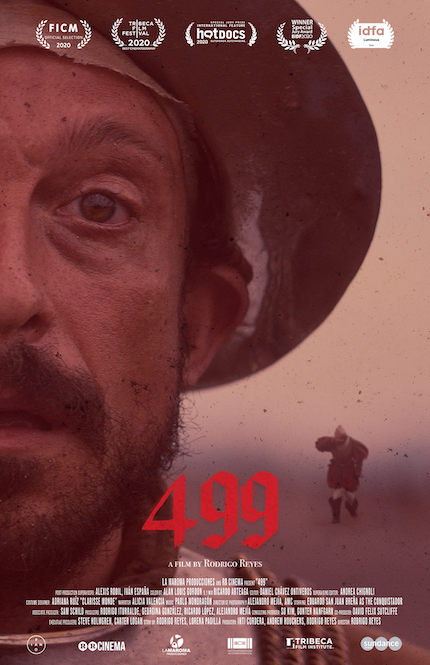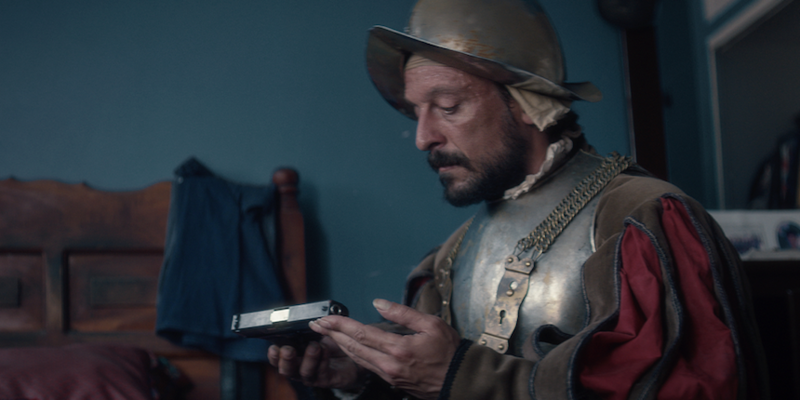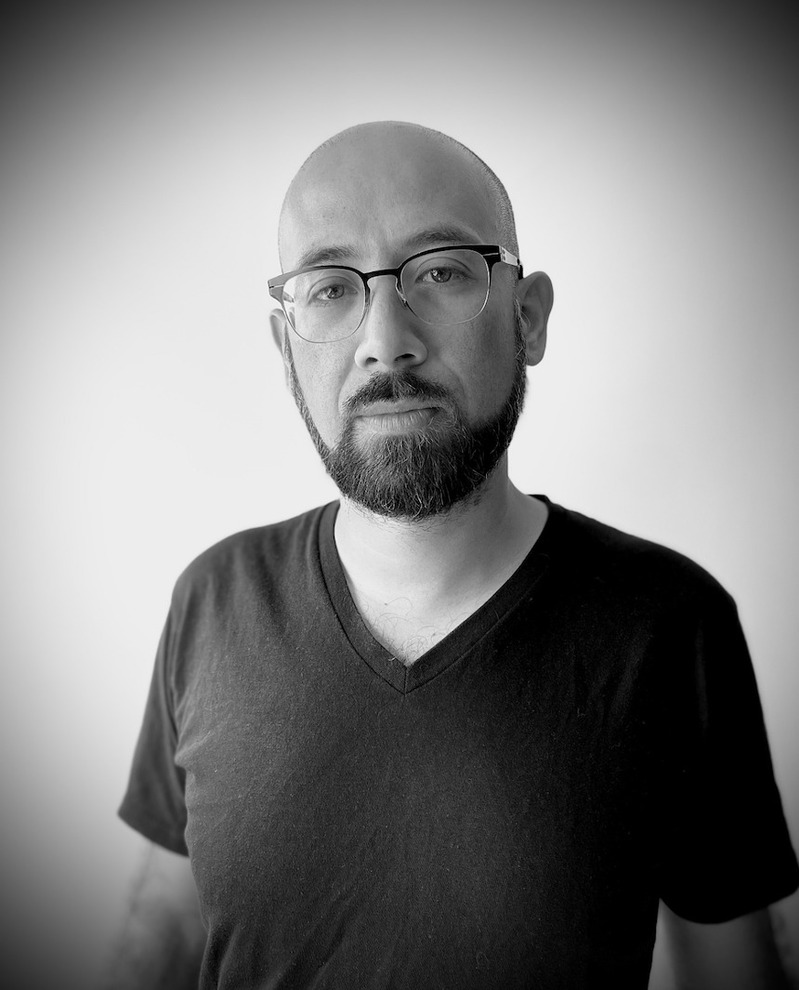Morelia 2020 Interview: Director Rodrigo Reyes on 499, A Docufiction About Mexico's Violent Past And Present

2021 will mark the 500th anniversary of the fall of Tenochtitlán, the capital of the Aztec Empire. No doubt this landmark is going to be a much-discussed topic in Mexico. Director Rodrigo Reyes has ready a film that by thinking back to the era of Hernán Cortés and the Aztecs is actually facing Mexico’s current reality.
In 499, a Spanish conquistador (played by Eduardo San Juan) arrives to modern-day Mexico. As the protagonist follows the route of Cortés to Tenochtitlán, Reyes delves into the documentary film genre, with testimonies that tackle such urgent issues as the consequences of the so-called Drug War, disappearances, forced migration and violence against women.
After having its world premiere at the Tribeca Film Festival earlier this year, where it won the award for Best Cinematography in a Documentary Film, 499 is now heading to the Morelia International Film Festival. On Saturday, October 31st, Reyes’ docufiction will have one screening in Morelia and also it will be available to watch online, for 24 hours, on the streaming platform Cinépolis Klic.
To commemorate the Mexican premiere of 499, I spoke via Zoom with its director. Check out the full interview below.
ScreenAnarchy: How did you come up with the idea of bringing a Spanish conquistador to the present?
Rodrigo Reyes: The film comes from the necessity of dealing with this anniversary. Anniversaries are always important, especially this one for Mexico. The Conquest is for our culture and intellectual life, the Big Bang of Mexican identity, it’s the epicenter of the earthquake from which Mexico was born.
We have a very long history of nationalism, from the murals of Diego Rivera and José Clemente Orozco to the present day, passing through Octavio Paz. The idea of the Conquest continues in our imagination.
I wanted to make a film about this anniversary but questioning its celebration and where we are now, where we are as a country. Use this look at history to reflect on the present. History is only useful for the future. So there was a chance to “hack” the anniversary and subvert it.
Columbus Day was just a couple of weeks ago. The controversy remains strong in this age of social media, with some people criticizing the celebration of colonialism, others criticizing the romanization of the Aztecs. What do you think of this current polarization?
We are in a moment of great intolerance of both the left and the right, we don’t know how to dialogue.
History has always been used to help those in power, they always want to control how we remember the past, especially to meet the needs of the present. This control of whether Cristobal Colón was good or bad, actually affects the present day, Colón doesn’t care, he’s already dead, we can’t undo those moments.
The Zapatistas said it well after the latest request for an apology that the Mexican government submitted, the Zapatistas say: indeed, stop using history as a political weapon, there are needs today.
We have things that are an important part of our cultural heritage (Spanish painting, literature and so forth). The problems today are in Mexico, where we have 300 thousand deaths from a totally failed and immoral war. We have a terrifying femicide rate. These are real problems that are being ignored with this obsession that hypnotizes us from the past.
The mixture of cultures in Mexico is very present in 499. We see images of bullfighting and Catholicism, but on the other hand the conquistador encounters, for example, the Papantla flyers…
The magic that the conquistador perceives in his trip to this Mexico where so many contradictions coexist, on the one hand Jesus Christ, on the other the pre-Hispanic rituals that have survived. He’s totally amazed and ends up being overwhelmed by the Mexican reality. I like to think that this conquistador already existed in our imagination and the only thing the film did was materialize him on the screen. But we didn’t invent anything that doesn’t exist in the psyche of our country.
The most interesting thing is that all the real people who offer testimonies to the conquistador joined the project understanding the thesis, the purpose of the film, and that this character had to listen to them. Now the narrative was going to be reversed and the ghost has to listen to us, the power has to listen. The script was successful in saying: the conquistador is going to listen because this act is powerful. Protest after protest, that’s required as a starting point: listen to us. There’s a lot of reluctance to listen to complaints from the society and the victims, especially in Mexico.
How did you decide to approach such themes as disappearances through documentary filmmaking?
At the beginning the film was a comedy, it was going to be a road movie where we saw a film crew degrading, trying to repeat the steps of Hernán Cortés.
As soon as I started to investigate thoroughly, I’m talking of a process of two and a half years of investigation before shooting (the film was shot in 2018), I found these parallels between the tools of violence of the past and the violence of today, how these monsters have transformed but not disappeared. All from Cortés’ route, this geography that somehow anchors us in Mexico: in Veracruz, through the volcanoes, to Mexico City. On that route there was an intersection of memories, of the exploits of the past and what’s happening today. What’s fascinating is that all the stories exist along that route, which draws an analysis of the malaise experienced in the country in terms of violence.
I want to be very clear: the film is about violence, it’s not a film that says "Mexico is violence" and that’s encyclopedic. Often with these important issues that strike a chord with us, we tend to misunderstand and say “no, the country is not that.“ Obviously, there’re fascinating things about our cultural syncretism, but the movie is about violence.
I kept digging, getting to know the issues and from there I was connecting with collaborators who helped me get to know the people who appear in the film. That contrast between documentary and fiction, the two elements come together in 499 and create a very interesting intermediate space, where you no longer know what’s fiction and what’s reality. Everything becomes part of a magical space.
You point out the parallelisms that the conquistador has with the migrants that come from Central America to try to reach the “American Dream.” How was the process to capture these testimonies?
Without revealing the end of the film, halfway through the conquistador’s path, he meets a group of migrants from Central America who are passing through our country and are in quite harsh conditions, in a shelter, very injured, waiting to get on the train. I had already located the shelter, I had spoken with the church that maintains it, but the detail with the migrants is that they enter and leave every day, it’s a very short stop and they get back on the train. On the day of the filming, we arrived in the morning and just like that, we stood in the courtyard of the shelter and explained to everyone out loud what the film was about, I introduced them to the team, I addressed some security concerns.
When explaining the thesis of the film with real people, there was a lot of generosity, people have a need to be heard when they are in situations of trauma and violence.
It must be remembered that many of the conquerors that came from Europe were migrants, some by force, some by ambition. They also came to this “new world” to generate another model of life or to improve in the scale of their society.
There are many parallels, it’s a moment when the conquistador begins to question himself, perhaps he’s not so different from these migrants. Besides, they receive him with great compassion, it’s something that we saw in the entire process of the film: collaborations with real people were always marked by a lot of generosity, there was no hatred towards the character or rancor, but a need to share something with him, that he listens to you and understands something of your story.
When the conquistador finally arrives to Tenochtitlán (Mexico City), I think the first shot is that of an overpopulated area. We know the consequences of that, for example Greater Mexico City is one of the most violent zones in the country. And everything will change drastically in the next, say, 100 years, in this city that continues to grow with no apparent control or plan. How do you see the future?
This scene was shot where the Lago de Texcoco once surrounded the entire Greater Tenochtitlán. Instead of that lake, of that impressive coexistence that the Aztecs had with nature, that ecological urban integration, we have a city growing and growing. The interesting thing is that several people have told me that, that it makes them think about the future and that’s precisely the key: what’s the future? What relationship do we have with the history that we are going to leave behind?
Then the conquistador goes to a garbage dump that’s also in the old site of the lake, the Bordo de Xochiaca. You realize that we doesn’t think about the future, we don’t have that control to try to build another future. However the possibilities are there all the time, to improve the quality of life and to address many of these problems.
The terrible problem of femicide in Greater Mexico City brings one of the toughest moments of 499, the testimony of a mother whose daughter was brutally murdered…
The statistics are dramatic: in Mexico 11 women a day suffer a femicidal attack. This testimony is brutal, heinous and should be unacceptable. That’s the question: why is it repeated?
Mrs. Lorena, who shares the testimony with us, is still active, in the struggle, more than two years later. It’s one voice among many that demands our compassion and responsibility. I’m very grateful for that clear, forceful, passionate and painful testimony. She shares a bit of what lives in her soul, what she has to endure everyday.
I understand that it’s hard to listen to these things, we prefer to ignore them, to look the other way. But we have that duty, we can’t let the garbage continue to grow because one day it will reach to us.
Like you said, violence is the central theme of 499. In that sense, what’s the main reflection you want people to make after watching the film?
We aren’t condemned to repeat our original curse. That’s totally false, there’s nothing that forces us to repeat this history except that we don’t take care of it.
I believe that each citizen has to take responsibility for us to heal, each one has to contribute something. I’m not saying that we all take the streets, but in our universe there are moments and spaces to support the fight for justice in Mexico. We mustn’t ignore it nor dismiss those who demand their voice to be heard.
We need another type of war, a war of love, a battle against indifference to the violence that’s being experienced in the country.









